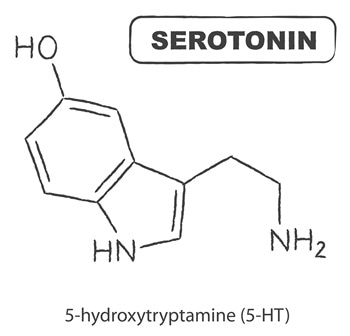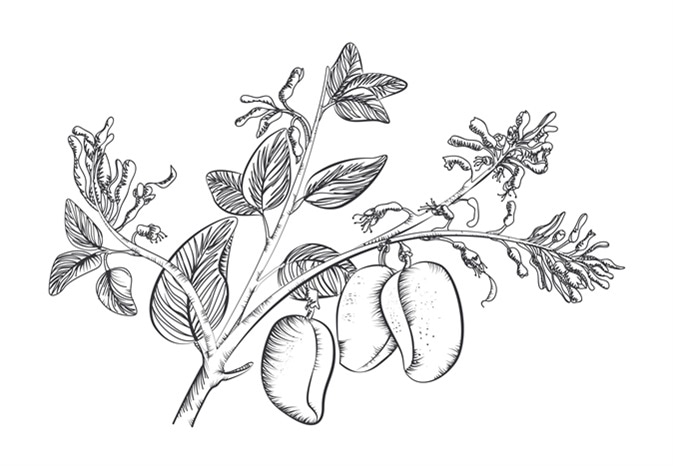5-Hydroxytryptophan (5-HTP) is a naturally occurring amino acid produced from the essential amino acid L-tryptophan. 5-HTP is the precursor for neurotransmitters, which are chemicals that transmit a nerve impulse across neuronal gaps that are called synapses. These neurotransmitters include serotonin and melatonin.
Serotonin, which is also known as 5-hydroxytryptamine (5-HT), primarily affects mood, promoting feelings of well-being. It also affects appetite, sleep cycles and pain perception. 5-HT is produced naturally by specialized enterochromaffin cells of the gut. The effect of 5-HT is dependent on signaling to target cells, via receptors on tissues, such as the gut and brain.

Chemical structure of Serotonin, the happiness hormone. 5-hydroxytryptamine (5-HT) monoamine neurotransmitter. Image Credit: Perception7 / Shutterstock
5-HTP is the intermediate metabolite produced in the conversion of L-tryptophan to serotonin. Crucially, it can cross the blood-brain barrier, a semipermeable seal comprised of a tight nit of endothelial cells. Contrastingly, 5-HT is synthesized in the intestines and cannot permeate the blood -brain barrier. Therefore, the total concentration of serotonin is dependent on the precursors L-tryptophan and 5-HTP, with the latter demonstrating increased ability to do so.
Producing Serotonin from 5-HTP
The conversion of L-tryptophan to 5-HTP is bypassed when 5-HTP is administered, as is the case in therapeutic treatment of mood disorders, such as anxiety and depression using 5-HTP. Indeed, inadequate levels of 5-HTP have been associated with numerous other dysfunctions relating to sleep, appetite, memory and digestion.
The naturally occurring 5-HTP in the seed pods of Griffonia simplicifolia, is used as a nootropic substance, which is a substance that enhances cognitive function. Subsequently, nutritional intake of 5-HTP can provide a theoretical means for restoring serotonin to optimal levels.

Griffonia Simplicifolia. Image Credit: Pisicasfioasa / Shutterstock
This is particularly advantageous as the conversion of L-tryptophan to 5-HTP by L-tryptophan hydroxylase, is the slowest, or rate-limiting step in the synthesis of serotonin. The enzyme adds a hydroxyl (OH) group onto serotonin. Subsequent conversion of 5-HTP to 5-HT is achieved by the activity of the enzyme Aromatic Amino Acid Decarboxylase (AAAD), and as the name suggests, it removes a carboxyl (CO2) group from 5-HTP.
This enzyme requires vitamin B6. Consequently, low levels of vitamin B6 have been associated with mood disorders.
Effects of Unbalanced 5-HTP Supplementation
5-HTP when administered in isolation can cause dysregulation of other neurotransmitters. The reason for this dysregulation is because the enzyme AAAD additionally catalyzes production of the catecholamines, a group of neurotransmitters, which includes dopamine, norepinephrine, and epinephrine.
This enzyme specifically catalyzes the production of dopamine from L-DOPA, the intermediate produced by the action of L-tyrosine hydroxylase on L-tyrosine.
In the presence of elevated levels of 5-HTP, the enzyme AAAD is engaged primarily in serotonin production, at the detriment of catecholamine production. Subsequently, 5-HTP supplementation in the absence of adequate L-DOPA or L-tyrosine will result in diminished concentrations of the catecholamines.
Further still:
- L-tyrosine may reduce serotonin, 5-HTP and sulphur amino acid
- L-dopa may reduce serotonin, L-tryptophan L-tyrosine and sulphur-containing amino acids.
- L-tryptophan may reduce dopamine
- Sulphur amino acids may reduce dopamine and serotonin
These imbalances are deleterious, and may exacerbate existing, or create new symptoms. It is therefore important that 5-HTP supplementation is balanced with appropriate levels of the amino acid precursors of dopamine and sulphur-containing amino acids.
The use of 5-HTP as a treatment for depression in theory is promising.
The combined ability to cross the blood-brain barrier and conversion to serotonin without causing feedback inhibition (inhibition of AAAD at certain, limiting concentrations of serotonin) makes it an ideal candidate to restore serotonin levels to treat mood disorders. However, 5-HTP operates in the context of a complex pool of neurotransmitters that exert depletive effects on one another when there is an improper balance between them, an effect that arises when 5-HTP is administered in isolation.
Therefore, simple supplementation with 5-HTP is associated with increased negative side-effects, including worsening of existing symptoms and onset of catecholamine-related symptoms.
Brain chemistry lifehacks: Steve Ilardi at TEDxKC
Further Reading
Last Updated: Oct 29, 2018